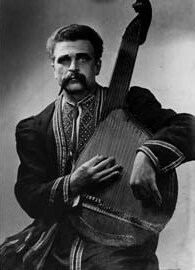Hryhory Bazhul
| Hryhory Bazhul (Baschul) | |
|---|---|

Hryhory Bazhul with his Kharkiv-style bandura (1948)
|
|
| Background information | |
| Birth name | Григорій Іванович Бажул |
| Also known as | Keleberd |
| Born | January 22, 1906 |
| Origin | Poltava region, Ukraine |
| Died | October 17, 1989 (aged 83) Sydney, Australia |
| Genres | Ukrainian folk, dumas and classical music |
| Instruments | bandura |
| Years active | 1930s to 1980s |
| Notable instruments | |
| Kharkiv-style bandura | |
Hryhory Ivanovych Bazhul (Ukrainian: Григорій Іванович Бажул transcribed as Georg Baschul) (January 22, 1906 — October 17, 1989) was a Ukrainian bandurist and publisher of articles on bandura history from Poltava, Russian Empire. After World War II he emigrated to Australia settling in Sydney.
Hryhory Ivanovych Bazhul was born in the Poltava Governorate of the Russian Empire (in present-day Ukraine), his father was a rail road engineer and his family moved to Kharkiv in 1911. After completing his studies at the Institute of Grain Culture, he was employed as an agronomist.
In the late 1920s he was arrested and spent 2 years of penal labour at the Berdyansk agricultural labour colony. On his return to Kharkiv he became interested in the bandura after hearing the blind kobzar, Pavlo Keleberda, playing on the streets. In 1931 he enrolled in bandura classes and studied with Hnat Khotkevych in the second group of students established at the Kharkiv worker's conservatory. In 1933, after the classes were closed, he continued to study privately with Khotkevych and soon became a close friend of his family.
In the early 1934, Bazhul was arrested again and charged with improperly giving bread ration coupons to the Khotkevych family during the period of the Famine-Holodomor. He was sentenced to two years in exile in Siberia, northern Caucasus and Tayshet. After serving his sentence he returned to Kharkiv in 1936.
In February 1938, Khotkevych was arrested by the NKVD (Soviet secret police) and in October he was shot in Kharkiv as an enemy of the state with all his possessions confiscated. Khotkevych's widow gave Bazhul a number of her husband's manuscripts for safekeeping. Some 60 manuscripts were preserved by Bazhul, including the original of the epic Bayda.
...
Wikipedia
